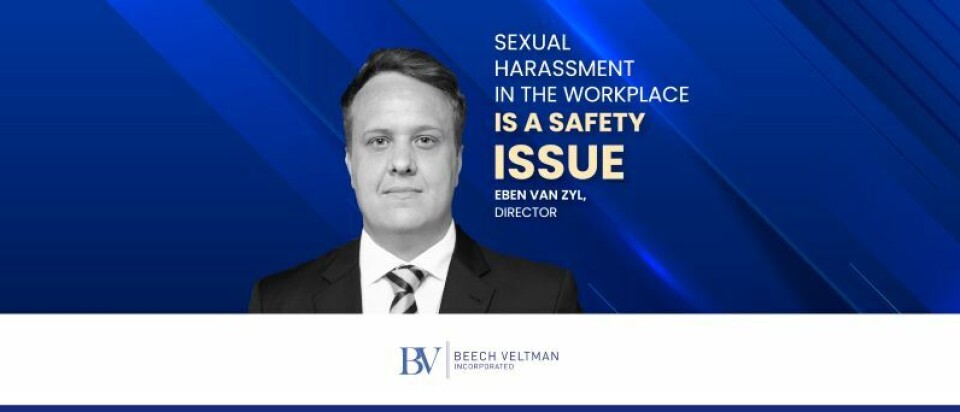While progress has been made to afford women equal work opportunities, legislation did not keep up with the rapidly changing employment landscape to ensure safe working places that are free of harassment. South Africa has developed legislative and policy frameworks that aim to strengthen gender equality and the participation of women in mining, but these policies did little to address the gender-based discrimination that still existed.
In 2022, the Minister of Employment and Labour, Thembelani Nxesi, issued a new code of good practice on the prevention and elimination of harassment in the workplace and repealed the Amended Code of Good Practice on the Handling of Sexual Harassment Cases in the Workplace 2005. This newer code of practice is intended to address the prevention, elimination and management of all forms of harassment that pervade the working place.
“Sexual harassment is unacceptable in any workplace, and must be eradicated,” commented Eben van Zyl, Director at Beech Veltman. He highlighted the way one mining giant worked to overcome this problem. “Rio Tinto appointed an external expert, Elizabeth Broderick & Co, to review its workplace culture and to compile a report into workplace culture at its operations. The purpose of the project was to identify workplace challenges such as bullying, sexual harassment, racism and other forms of discrimination.”
He explained that work health and safety legislation can be used to drive meaningful change on sexual harassment in the workplace and believes that sexual harassment should be treated as a health and safety issue so that it becomes everyone’s business, not just a human resources issue.
In March 2020 the Minerals Council of South Africa published a “Women in mining in South Africa fact sheet”, in which they said: “One of the biggest concerns facing women who want to work underground is safety – specifically the risk of sexual harassment, and even sexual violence, directed at them by their male colleagues and by illegal miners.”
Van Zyl noted that under the Mine Health and Safety Act No. 29 of 1996 (MHSA), employers are required to provide and maintain a working environment that is safe and without risk to employees' health or safety.
“Some of the safety changes that have been implemented by employers to enable women to feel safe when working underground include improving lighting; providing safe toilet facilities, shower and changing facilities; and ensuring that women have work buddies who make sure they do not have to move around quiet areas on their own,” he explained. “The mining industry also acknowledges that the best way to ensure women’s safety at work is to change the mindset of their male colleagues and this is an abiding priority, which may require effort and time in a traditionally male-dominated industry.”
Van Zyl says the new code of practice represents a significant step forward in aligning South African legislation with international best practices for workplaces. By specifically addressing harassment in the workplace and requiring employers to take necessary steps to eliminate harassment, the new code of practice serves as a crucial tool in promoting safe and equal working conditions in the mining industry and beyond.
“I hope to see mining houses implement further initiatives to make the working place as inclusive as possible for women, especially in the underground working environments,” Van Zyl commented. “Women must be free to perform their duties and functions without fear of harassment. It is imperative that any occurrences or reports of sexual harassment in the workplace are investigated and dealt with as expeditiously as possible.”
To read more about this issue click here.
To join Africa Legal's mailing list please click here

